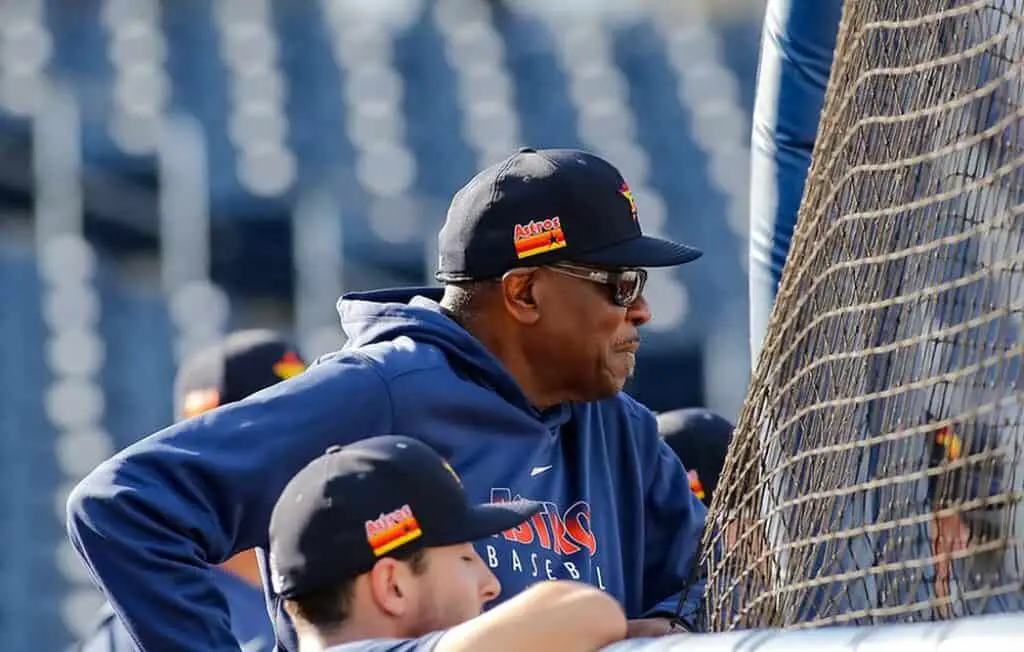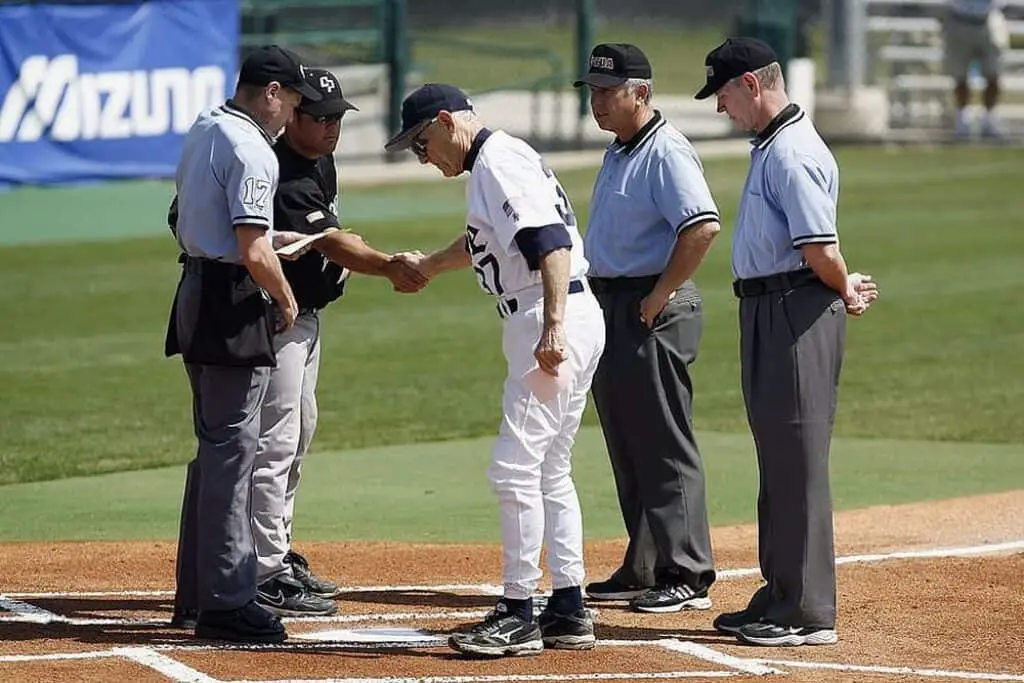Baseball Manager vs Coach – What’s The Difference?
When a baseball team wins a game or goes on to bag a trophy, most of the praise goes to players, and deservedly so.
After all, they’re the ones on the field, making all the crucial plays and working hard every day to be able to perform when needed.
Nevertheless, no team is successful unless it functions like a well-oiled machine. And, the person in charge of making sure that happens is the baseball manager.
Managers have similar duties in running the team as head coaches in major professional sports.
However, besides managers, baseball teams also employ coaches. This often confuses people and creates misunderstandings regarding who does what.
To make things clearer, I compare baseball manager vs coach to see what are the differences and similarities between the two jobs.
Plus, I’ll explain what are the role and main duties of both these baseball staff members.
| Baseball Manager | Baseball Coach | |
| Responsibilities | Responsible for overall team management | Focused on player development and skill improvement. |
| In-game decisions | Makes key strategic decisions during games | Offers tactical suggestions and advice to players during games |
| Experience | Generally has more experience and a longer tenure with the team, often serving as the team’s public face and spokesperson | May have less experience than the manager, but may specialize in a particular area such as hitting or pitching |
| Role on coaching staff | Often the head of the coaching staff | Typically a key member of the coaching staff |
Table of Contents
What Is A Baseball Manager?

In baseball, a manager is a person who’s in charge of the day-to-day running of the ball club and making in-game tactical decisions.
This means that the manager’s responsibilities include having a final word on decisions concerning lineup selection, game strategy, and in-game substitutions.
Managers also set clubhouse policies, and lead team practices.
Also, a part of the manager’s duties is to represent the club and serve as the face of the franchise.
This part of the job includes communicating with the media and answering journalists’ questions at press conferences.
Commonly, managers answer directly to general managers.
While the manager has the final say regarding all on-field, clubhouse, and training matters, GMs are responsible for long-term planning, roster construction, and off-field personnel decisions.
On the other hand, the amount of control of day to-day-operation varies from manager to manager and they typically delegate some of the responsibilities to their coaches.
What Is A Baseball Coach?

While the manager oversees the functioning of the team and daily operations, some of the more specific tasks are handled by baseball coaches.
Coaches assist the manager to ensure that everything is functioning smoothly. They take care of some of the more minute details of strategy, training, and player development.
Some of them sit with the manager at the dugout during the games and take part in the in-game decision-making while the others have more off-the-field duties.
The most important person on the coaching staff is the bench coach who is, practically, the manager’s right hand and the equivalent of assistant coaches in other major sports.
Besides the bench coach, teams usually employ more than half a dozen other coaches with more specialized responsibilities.
Typically, managers get to pick their own coaching staff. Below are some of the most common types of coaches working under the manager.
Bench Coach
The bench coach of a baseball team acts as second in command and a person managers often turn for advice.
During the game, the manager will often consult with the bench coach prior to making a particular move.
Plus, the bench coach is usually responsible for setting up the pre-game practice situations and stretching routines.
Also, if the manager is ejected or has to leave the game for any other reason, the bench coach takes over the managerial duties.
In case the manager gets fired or resigns, the bench coach usually becomes the interim manager and is often the favorite for the permanent position.
Pitching And Bullpen Coaches
The pitching coach’s main responsibility is mentoring and training pitchers.
He works with pitchers on the training ground to help them improve throwing mechanics and technique.
During the game, he also provides valuable advice both to the pitcher currently on the mound and the manager.
The bullpen coach’s job is rather similar to pitching coach, but he works with relief pitchers.
During the game, he stays in the bullpen helping relievers warm up and prepare for their turn on the mound.
Base Coaches
During the game, base coaches are situated in coach boxes near the bases while the team is at-bat.
The first base coach sits in the coach’s box on the first base line. He mainly relays signals from the dugout, and advises 1st base runners on base running.
The third base coach’s job is more stressful and carried more responsibility as he has to decide whether to send home the runner heading towards the third base.
Hitting Coach
The hitting coach’s primary duty is to help players with their hitting technique and skills.
He works with players at practices, during cage sessions, but also in the course of the game, between at-bats, and during pre-game batting practice.
A part of the hitting coach’s responsibilities is to scout analyze opposing pitchers and advice batters who are about to face them.
Baseball Manager vs Coach – What Are The Differences?
The baseball manager and coach mainly differ in the scope of their responsibilities.
Higher in the team’s hierarchy than coaches, managers make crucial tactical and operational decisions and set the direction in which the team is going, both on and off the field.
Coaches are more specialized and commonly concentrate only on certain aspects of the game such as pitching or hitting.
In those areas, they provide valuable advice to the manager and help him concentrate on the more big-picture stuff.
Still, it’s important to note, that while coaches’ input is very useful, the final say on most game and training-related matters lies with the manager.
Furthermore, the job of a coach commonly starts and ends on the field or training ground, while the manager also has to communicate with the media and keep an eye on the overall goals of the franchise.
Conclusion
A ball club is way more likely to win games and be successful if it’s properly run and managed.
A good baseball manager is often capable to get the most out of a team with less talent and lead them to success.
It also works the other way around, as poor management can be the main reason for the failure of a talent-filled roster.
So, the role of the manager in running a successful baseball franchise can’t be overstated. However, part of his job is to find and hire decent coaching staff.
Coaches on the baseball team who are good at their jobs are the key to player development and often provide invaluable help to managers when it comes to crucial in-game decisions.




